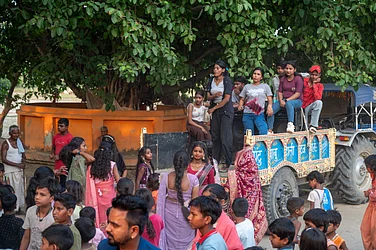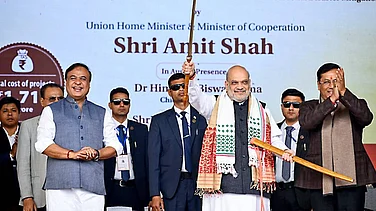A year ago, an AIADMK minusJayalalitha Jayaram seemed an impossibility. With the arrest of the former chief ministeron December 7 in connection with the dubious purchase of 45,302 colour TV sets, the partywill now have to learn to live without its leader. The TV purchase itself caused a loss ofRs 8.3 crore to the state exchequer. And with the CBI, CID and the Department of Vigilanceand Anti-Corruption filing six other cases against her, lawyers see no immediate end tothe legal wrangles that lie ahead of her. Meanwhile, her political equity, which wasalready on a downslide, has hit rock-bottom.
The only thing that could have perhaps slowed down the pace of theinvestigations was public outrage. But when she was finally arrested from her Poes Gardenresidence at 9.45 am on the fateful day, no riots broke out in Chennai. Neither were thereany mass demonstrations. In fact, there are rebel factions within her own party which aresecretly welcoming her arrest. They are of the view that with Jayalalitha out of thepicture, the AIADMK could regroup and refurbish its image.
It was just a few months ago that the rebels sought her expulsion, orat least a commitment from her that she would keep her live-in confidante Sasikala out ofpolitics. When the going got too tough, the AIADMK chief was forced to give in. She issueda statement that she had severed ties with her friend and her nephews, one of whom wasalso her foster son.
However, a few days before her arrest, Jayalalitha renewed herfriendship with Sasikala with an emotional 14-page statement accusing Tamil Nadu ChiefMinister M. Karunanidhi and Union Finance Minister P. Chidambaram for being vindictivetowards Sasikala. The two, she claimed, were "sadistically harassing Sasikala becauseshe is close to me".
But now that she is lodged in Central Prison, Chennai, as a common prisoner and sharesher cell with other inmates (and has the same food), the former chief minister has much toworry about. Apart from the case she has now been booked for, the charges against herinclude: receipt of $300,000 under the immunity scheme; irregularities in the exemptiongiven to Pleasant Stay Hotel in Kodaikanal; her role in the coal import deal; fav-oursshown to Meena Advertising; purchase of TAMIN property; and amassing wealthdisproportionate to her known sources of income.
In the colour television sets case, the key players were Jayalalithaand her local administration minister, T.M. Selvaganapathy. The amount passed on to thelatter alone was a mind-boggling Rs 3.93 crore. Officials from various TV companies,including Uptron India, Keltron and other TV suppliers, were involved in theunder-the-table payments. Among those who allegedly made the payment was Keltron India LtdDirector Balan Nambiar.
On July 27, 1995, Jaya-lalitha had decided at a cabinet meeting that the TV sets shouldbe purchased. The TV approval committee, which was immediately set up, fixed the cost perset at Rs 14,500. This included the cut that was subsequently paid. The cut per set wasalso fixed by the committee.
The distribution of TV sets to pan-chayats was part of a grand schemeenvisaged by Sasikala and her nephews, who had set up the now defunct satellite channel,JJ TV. The plan was to wire up rural Tamil Nadu by distributing TV sets whilesimultaneously setting up a dish antenna network which would be tuned to JJ TV. It wasbelieved that this would enable Jayalalitha to reach out to the masses, thereby enablingan AIADMK victory.
HOWEVER, the scheme did not quite take off as the pilot project inChennai (a central receiving centre was established to distribute signals all over thecity) was met with strong resistance from cable operators owing allegiance to the rivalSun TV, which is owned by Karunanidhis family. It was feared that the receivingcentre would black out Sun TV.
While Jayalalithas arrest had seemed imminent in the last fewweeks, she did her best to postpone the inevitable by approaching the courts. On December6, however, Justice C. Shivappa dismissed all the seven anticipatory bail applicationsfiled by the AIADMK chief. The strongly-worded judgement noted that since "thesubstratum of the case is that offences were perpetrated against the state and itseconomy, such offences being heinous in nature, it was not proper to grant anticipatorybail, which might have an effect of interference in the investigation. The charge is soserious that investigation had to be done in India and abroad. It would be virtually inaptto grant bail."
The investigating officials were quick to move in, and in less than24 hours the once-invincible Jayalalitha was finally in the CID net. In a simultaneousmove, Income Tax officials attached four properties in Chennai belonging to Jayalalitha onthe grounds that she failed to pay income tax to the tune of Rs 4 crore for six assessmentyears. The properties are: land and building at number 31A (since merged with number 36),Poes Garden; land and building at no. 36, Poes Garden; land and building at 213-B, StMarys Road, Raja Annamalai Puram; and shop no. 18 in Parsan Manre on Anna Salai.With the attachment of these properties, Jayalalitha has been prohibited from mortgagingor disposing of these holdings. The Department of Vigilance and Anti-Corruption has alsofrozen her savings and current account in the Abhiramapuram branch of the Canara Bank andfixed deposits worth Rs 70 lakh in Shriram Investments.
In the weeks to come, many heads arelikely to roll as investigating offi-cials file further charge-sheets. Virtually theentire AIADMK cabinet is being investigated and, in many of the cases, officials ofcorporate houses and PSUs are said to be involved. The AIADMK cadres, who were alreadydemoralised by the electoral debacle and by the vertical split in the party, now haveenough reason to press for a change of leadership. Today there are four offi-ciallyrecognised AIADMK splinter groups: led, respectively, by Jayalali-tha, her one-timeministerial colleagues S.D. Soma-sundaram, R.M.J. Veera-ppan and Alagu Thirunav-ukkarasu.Now, the school of thought that the factions could come together in a party frameworkwhereby Jayalalitha is no longer the leader is again gaining ground.
Jayalalithas latest defence of Sasikala also invoked the wrath ofthe cadres. In her December 5 statement, she made it clear that she could not desert herfriend. She also absolved Sasikala of any role in the AIADMK electoral debacle."(Sasikala) is not responsible for the partys defeat," said the statement."I was forced to cut off ties with Sasikala when the rebels mounted a campaign. Isnapped my relationship with my friend of 12 years who had shared the ups and downs of mylife. I did not even visit her in jail for three months." Political observers inChennai say this sudden change of stance only brought on the AIADMK chiefs nemesis.Sasikala and the extra-constitutional powers she wielded in the party have long been asource of concern. While no one openly protested against the nexus while Jayalalitha wasin power, the dissent is now plain to see. A purge in the AIADMK is expected to belaunched soon. As for Jayalalitha, there is the tough task ahead of explaining how thecrores came to her when her salary was a measly Re 1 a month.




















.png?w=200&auto=format%2Ccompress&fit=max)





